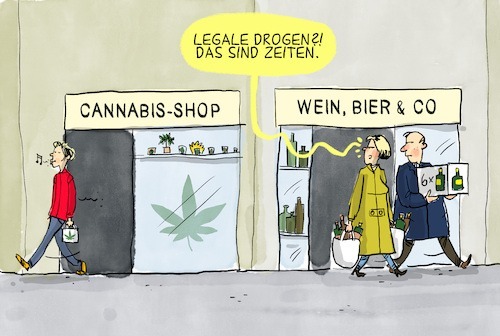This Friday, a significant event in the realm of drug policy reform is poised to unfold in Germany, as the Bundesrat (Federal Council) makes a pivotal decision on the legalization of cannabis.
At the heart of the debate is whether the Christian Democratic Union (CDU) can leverage the invocation of the Vermittlungsausschuss (Mediation Committee) to delay or thwart the legalization process. The dynamics of German politics, however, suggest that this move is not straightforward. The CDU, standing in opposition to the proposal, faces a complex landscape shaped by coalition agreements and procedural rules that govern the Bundesrat’s voting mechanisms.
Germany’s federal system necessitates that each Bundesland (federal state) casts its votes uniformly. Any divergence within a state’s representation renders its vote invalid. This principle is crucial in the context of states like Saxony, where internal coalition dynamics restrict unilateral action against the cannabis legislation. Despite opposition from CDU leadership, the coalition agreement necessitates abstention or unity in voting, limiting the CDU’s capacity to enforce a blockade via the Vermittlungsausschuss.

The anticipation builds as the CDU’s opposition is met with steadfast commitment from the SPD (Social Democratic Party), FDP (Free Democratic Party), and The Greens, who collectively hold the key to advancing the legislation. The stance of these parties underscores a broader consensus on the need for reform, positioning cannabis legalization as a progressive step forward, despite the CDU’s calls for a total blockade, which also imperils medicinal cannabis provisions uncontested in their necessity.
Rheinland-Pfalz emerges as a state of interest, with Minister President Malu Dreyer (SPD) expressing confidence in the legislation’s passage and dismissing the possibility of a deadlock through the Vermittlungsausschuss. This position highlights a strategic alignment within the Ampel-Koalition (Traffic Light Coalition) at the federal level, emphasizing a collective push towards legalization.
The opposition extends beyond the CDU, with the CSU (Christian Social Union) explicitly refusing to engage in any amendments to the cannabis legislation, should it be referred to the Vermittlungsausschuss. This stance, articulated by CSU parliamentary group leader Alexander Dobrindt, reinforces the divide between reform advocates and conservative elements within Germany’s political spectrum.
Quick Overview: Key Concerns from Bundesrat Committees
🔹 Dive into the Bundesrat committees’ recommendations here: https://www.bundesrat.de/SharedDocs/drucksachen/2024/0001-0100/92-1-24.pdf?__blob=publicationFile&v=1
🔹 The rise of groups leasing spaces to various clubs is under scrutiny for promoting opaque business practices, rather than fostering member-driven growth.
🔹 A push for the minimum legal age to be raised to 25, instead of 18.
🔹 A proposed 500-meter buffer zone from children’s facilities.
🔹 Public consumption issues.
🔹 A call for more preventive measures.
🔹 Concerns over the bureaucratic load to implement and enforce the law.
🔹 Challenges in granting amnesty due to existing and past legal decisions.
🔹 Recommendation to delay implementation to October 2024.
The Vote’s Potential Risk to the Bill:
🔹 Initially, the Cannabis Act (CanG) does not require the Bundesrat’s approval.
🔹 However, a simple majority in the Bundesrat can trigger the formation of a mediation committee to negotiate between the Bundestag and Bundesrat.
🔹 Typically, the ruling coalition’s majority should prevent the need for a mediation committee.
🔹 Yet, if a state’s representatives are divided (e.g., CDU for mediation and Greens against), the state’s vote is considered neutral but effectively counts against the bill, favoring mediation.
🔹 Additionally, some states have ruling parties (Greens, SPD, Liberals) expressing reservations, further complicating the vote’s outcome.








